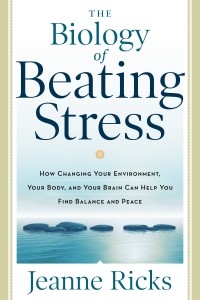These days, antacids are your most-efficient office assistant.
Aspirin is your co-worker. Sodium bicarbonate, your best friend. And stress? It’s your roommate and constant companion.
Maybe it’s the up-and-down of the economy that’s made you feel this way. Maybe it’s the uncertainty that accompanies today’s workplace or perhaps it’s a combination of all of the above, but you’re a bundle of ready-to-scream. You need “The Biology of Beating Stress” by Jeanne Ricks.
Your grandfather was a hard worker. Your mother is a businesswoman and you’re a Type A person, just like them. You might have their entrepreneurial genes, but genetics are not what drives stress and makes you miserable. Your environment, the people in it, and how you feel about those factors is what makes you seize up and grit your teeth in anxiety and irritation. That also causes belly fat, and it can make you physically sick.
In order to start ridding your life of stress, you need to first acknowledge that you’re fed up. “Be in the moment,” says Ricks, “and not on auto-pilot.”
Next, learn to use the “STOP Technique,” which requires that you tell yourself to STOP whatever you’re doing, “absorb the scene around you,” relax, and breathe. On that note, learning to breathe properly (which Ricks says “most of us” don’t know how to do) is imperative.
“The best thing about deep breathing,” she says, “is that you can do it anywhere…”
Get outside and go for a walk; studies show that being outdoors eases stress. Know which
foods are the healthiest for you when you’re feeling on edge. Talk to your doctor about taking nutritional supplements and digestive enzymes. Think like a cat: s-t-r-e-t-c-h. and move. Write down your feelings and make an “attention list” every night, so you don’t fret about forgetting something, and can sleep better. Look for time to exercise; Ricks says all you need are 20 minutes, three times a week. Forget about perfection (“a myth”), learn to forego blame when mistakes are made, and remember that change is out of your control.
Finally, learn to deal with “6 Big Ones” – the biggest anxiety-producers – by using tools for “all-purpose… jitter reduction.” And “be kind. It costs you nothing…”
“The Biology of Beating Stress” might seem to fit in the new-agey column. It would be less so without its cheerleader atmosphere and the abundance of exclamation points!! but, that aside, what you’ll find here is sound advice.
At issue, however, is that it’s a lot of common sense and information that’s been heard before. If, in fact, you’ve read anything about stress-reduction, you’ve read this book. Still, author Jeanne Ricks’ instructions are good reminders; they’re accessible, easy to understand, and can be implemented with little-to-no money and almost no experience in this kind of self-improvement.
And there, I think, is where the appeal of this book lies: its ease-of-use means quick help if you’re tearing your hair out. And if that’s what you need now, skipping “The Biology of Beating Stress” may be a bitter pill to swallow.






Comments are closed.